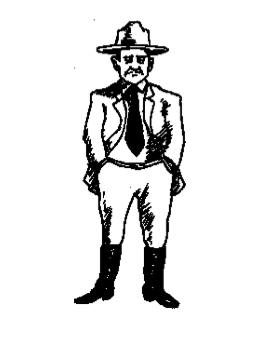1.
I parked at the visitor’s center of Jack London State Historic Park, awaiting the arrival of America’s—and the world’s—preeminent Jack London impersonator. We’d been telephoning and exchanging emails for six months, and I’d finally flown to San Francisco, rented a car, and driven up to Sonoma County, site of London’s Beauty Ranch and the place where in 1916 the author succumbed to a life of smoking, drinking, and hard living—and died at age forty. When a slick pickup glided into the lot, I saw a frame around the license plate that said Mike Wilson as Jack London. I knew I had my man.
The Call of the Wild was one of the first books I owned. It sat on the shelf beside four-legged weepers like Old Yeller, The Incredible Journey, and Where the Red Fern Grows. Informal polling among friends who consider themselves well read confirmed that while just about everyone could identify London as an author of dog stories for boys, only the rarest few had, since puberty, read any of his fifty books. Even fewer knew that the bulk of London’s work has nothing to do with dogs, or wolves, or any other creature. London churned out novels and essays—at the unwavering rate of a thousand words a day—delving into the turn of the century’s most contentious debates: poverty and class injustice; the threat of authoritarianism and the specter of a workers’ revolution; Darwinism and eugenics; prohibition and the plague of alcoholism; and the place of that American archetype—the freedom-seeking individualist—in an increasingly industrial and interdependent nation. He was the most successful writer of his era, his handsome mug so widely published in the nascent age of photography that some historians call him America’s first celebrity. And while his name remains nearly as iconic as canon standards like Mark Twain or Ernest Hemingway, in my ten years of studying literature I was never assigned a single of London’s books.
In the months preceding my trip to Sonoma’s Valley of the Moon, I’d been gulping up his books—most of which, I’d learned, were not regularly stocked at the local bookstore. In them I was finding the origins of three strands of twentieth-century writing. In his stylization of action and pitiless depictions of death and violence, I heard the quintessentially American voice that would come to be called Hemingwayesque and that a century later echoes in the novels of Cormac McCarthy. London’s pugnacious political essays and gloomy futuristic fables seem the blueprint for anti-totalitarian works like 1984, Brave New World, and It Can’t Happen Here. And his loose tales of countrywide rambling, freight-hopping, and...
You have reached your article limit
Sign up for a digital subscription and continue reading all new issues, plus our entire archives, for just $1.50/month.
Already a subscriber? Sign in





